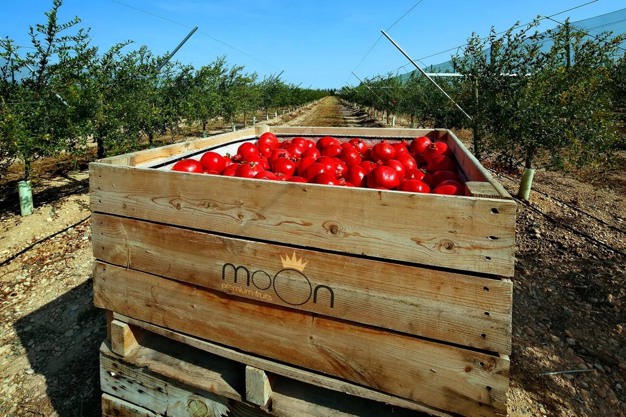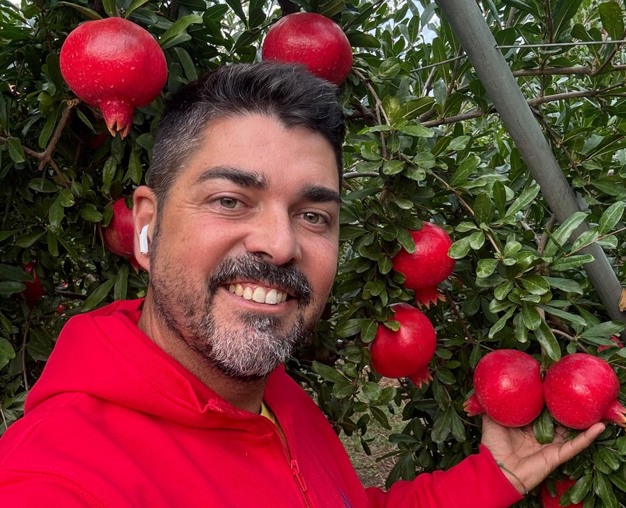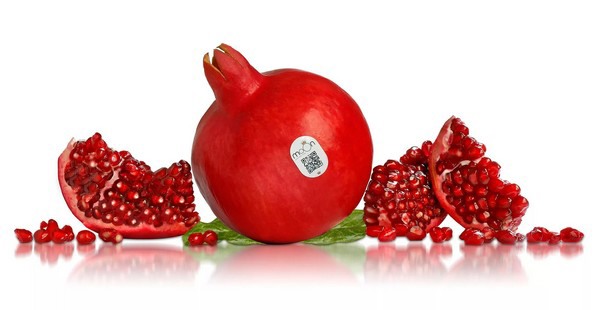One of the most northernmost pomegranate plantations in Spain is located in Alcolea de Cinca, Huesca. "Since we're outside the traditional pomegranate-producing area, our production starts at the end of August, some 10-15 days later than in the area of Levante. That means our season also ends a couple of weeks later and we can take advantage of that marketing window," stated Manuel Fortón, manager of Moon Premium Fruits. "It also means that we continue to offer the large-sized fruit that the market demands when the size in other production areas starts to drop."

"Our location has also isolated us from the pests affecting pomegranates in the Mediterranean, including cotonet and thrips. It's not that these pests can't arrive in Huesca. They can. They just haven't done so yet, which is a positive thing. This season, the quality of the fruit is perfect. In addition, we also increased production."

Manuel's production also stands out because of the variety he grows. "We are one of the few Spanish companies that have the license to grow the Emek and Shany Israeli varieties. These red varieties are well recognized and highly appreciated in Europe thanks to their superior quality. They produce large-caliber fruit and have higher yields than other varieties."
"They have a great balance between sweetness and acidity. In addition, they're also very juicy and refreshing, perhaps more than the Wonderful or Mollar de Elche varieties."

"100% of our crop is destined for export. Our main markets are Germany, Belgium, Switzerland, the Czech Republic, the United Kingdom, and France, which highly appreciate red pomegranate varieties. There was a lot of demand at the start of the season. However, there's been a slowdown in sales this week. We believe it's related to the weather conditions in Europe, which may have slowed down consumption a bit. We hope that the season will continue as normal."
"We've also noticed, and this is not normal, that there's been a notable increase in calls from people from Alicante interested in buying our fruits. It's possible they didn't achieve the expected production and need to continue supplying their customers," Manuel said.

Manuel Fortón became interested in pomegranates years ago on a visit to the Fruit Logistica fair. At that time, he wanted to start growing fruits on his 200-hectare farm in Alcolea de Cinca, where he grew olive trees and other vegetables. "Back then, the subject of functional fruits was all the rage. When people spoke about fruits with a high concentration of antioxidants they would talk about berries or pomegranates. So I decided to take the plunge into pomegranate cultivation."
"I found a nurseryman who worked with these varieties from Israel, and after making several trips to that country to see their plantations and study if they could be grown in this area, I decided to take a risk and bring varieties that had not yet been tested in Spain."

"Not only did we prove that it's possible to grow high-quality red pomegranates in Huesca, but thanks to the difference in temperature between day and night - which are usually cold - we get pomegranates with a greater coloration than those grown in other areas."
 For more information:
For more information:
Moon Premium Fruits
Calle Mayor 1,3 22410 Alcolea de Cinca (Huesca)
Tel.: +34 667 219 606
Email: [email protected]
https://moonpremiumfruits.com
